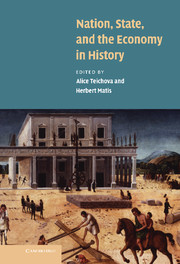Book contents
- Frontmatter
- Contents
- List of figures
- List of tables
- List of contributors
- Acknowledgements
- Introduction
- PART I
- PART II
- PART III
- PART IV
- PART V
- 18 The state and economic growth in Latin America: Brazil and Mexico, nineteenth and early twentieth centuries
- 19 Building the Brazilian nation-state: from colony to globalisation
- 20 The role of nationhood in the economic development of the USA
- 21 Economic policy and Australian state building: from labourist-protectionism to globalisation
- Index
19 - Building the Brazilian nation-state: from colony to globalisation
Published online by Cambridge University Press: 07 September 2009
- Frontmatter
- Contents
- List of figures
- List of tables
- List of contributors
- Acknowledgements
- Introduction
- PART I
- PART II
- PART III
- PART IV
- PART V
- 18 The state and economic growth in Latin America: Brazil and Mexico, nineteenth and early twentieth centuries
- 19 Building the Brazilian nation-state: from colony to globalisation
- 20 The role of nationhood in the economic development of the USA
- 21 Economic policy and Australian state building: from labourist-protectionism to globalisation
- Index
Summary
The Brazilian state played an essential role in the formation of its own country. In fact, Brazil is a creation of the Portuguese state. Our territorial unit is also a creation of the state. The state articulated all efforts to face the challenge of industrialisation and to make it possible. Once a basic productive infrastructure had been installed, favourable conditions were created for the completion of the construction of a national social plan.
Celso Furtado.INTRODUCTION
In Brazil, the building of a nation-state, as an exogenous process, began as a result of the emergence of European states, capitalist world expansion and colonial conquest after the great discoveries. The two constitutive elements of the modern state, territory and people, were constructed from outside until its independence. Brazil's demographic growth as a Portuguese colony followed the occupation process and the settlement and exploration of its territory. Production of sugar was the raison d'être of the economy leading to the growth of population in the sixteenth and seventeenth centuries in the north and north-east regions. The discovery of gold and other precious metals was the main factor promoting population growth in the central hinterlands towards the west during the eighteenth century.
Mineral exploitation was an important factor in building Brazilian unity as a continental state. The rush for gold and other precious metals in Minas Gerais (1690 to 1760) and Goiás and Mato Grosso made these the economic powerhouse in the hinterland of Brazil.
- Type
- Chapter
- Information
- Nation, State and the Economy in History , pp. 373 - 386Publisher: Cambridge University PressPrint publication year: 2003
- 2
- Cited by



